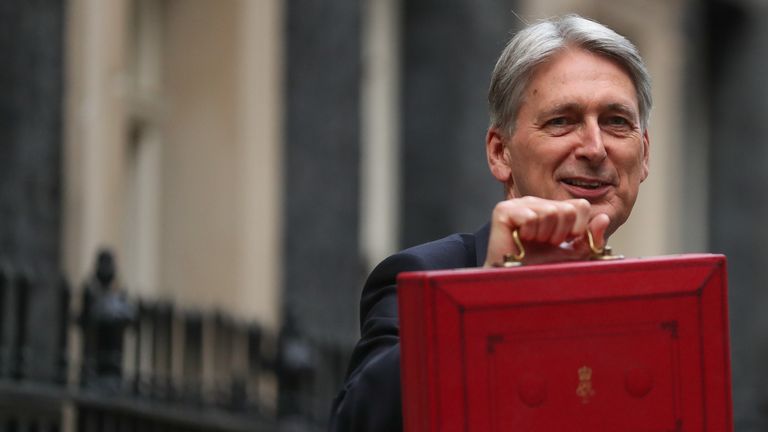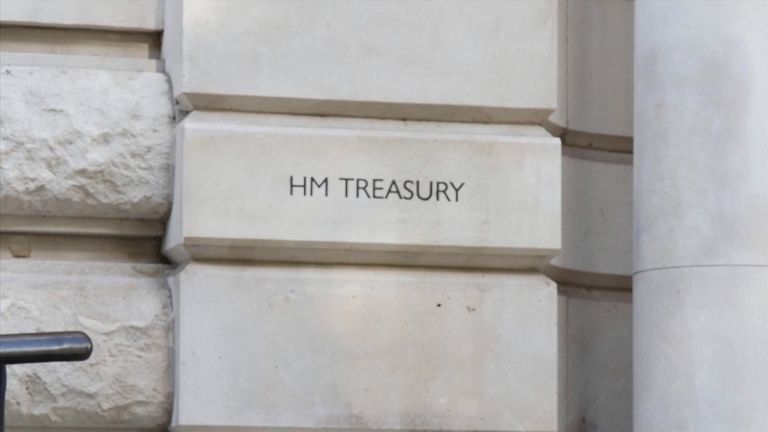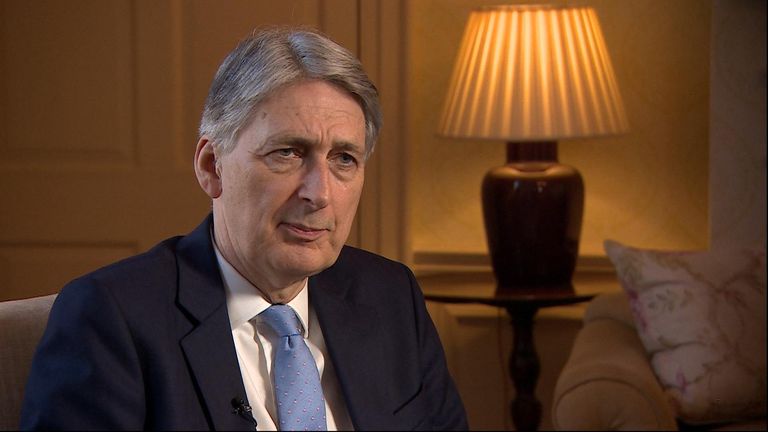Hammond must find 'extra billions' if austerity is to end, think tank warns
The IFS sets out a series of choices facing the chancellor as Brexit fog complicates the future state of the public finances.
Monday 11 February 2019 18:58, UK
The era of austerity in the UK will continue unless Philip Hammond finds "extra billions" to spend, according to the Institute for Fiscal Studies (IFS).
To preserve current per capita levels of spending across Whitehall departments which do not have ring-fenced budgets, the IFS estimates the chancellor would need to find an additional £5bn a year by 2023-24.
The think tank also warned that Mr Hammond would need to spend £11bn to avoid day-to-day spending falling as a share of national income.
The IFS figures follow analysis of the choices facing the chancellor in this year's spending review.
It claimed that spending increases already promised by the chancellor could be swallowed by commitments to fund the NHS, defence and international aid - potentially resulting in cuts to other departments.
According to the IFS, a no-deal Brexit would complicate its calculations as taxes would have to rise or spending would have to be cut to account for expected lower economic growth.
With that Brexit fog in mind, it suggested Mr Hammond may wish to reduce the number of years covered by the spending review - and only set out plans for the 2020-21 financial year.
The report said: "The provisional totals set out in the autumn budget imply that day-to-day public service spending will increase by 6.1% (£18.2bn) between 2018-19 and 2023-24.
"This would outstrip population growth, putting per capita spending on an upward trend.
"But this would not be enough to meet the cost of the government's existing spending commitments on the NHS, defence and overseas aid while avoiding cuts elsewhere.
"Other 'unprotected' areas are therefore, on current plans, facing further budget cuts of around 0.4% per year in real terms between 2019-20 and 2023-24, and cuts of 0.9% per year in per capita spending.
"This would slow the pace of the cuts experienced by those areas since 2010, but would by no means represent an 'end to austerity'", the study concluded.
Report author Ben Zaranko added: "The chancellor needs to decide what period the next spending review should cover and what funding to make available to it.
"This could be the most important announcement in next month's spring statement."
A Treasury spokesperson responded: "The Chancellor has said that the Spending Review will take place in 2019, and that is the right moment for government to make long term funding decisions.
"We have made clear that health is our number one spending priority by announcing a five-year settlement which will provide an extra £34bn a year for the NHS by 2023-24.
"Outside the NHS, total day to day departmental spending is now set to grow in line with inflation, and public investment will reach levels not sustained in 40 years in this parliament."
Shadow chancellor John McDonnell said: "The evidence is mounting that despite Theresa May's rhetoric, austerity is not over.
"Unless Philip Hammond, at the very least, finds another £5bn at the spring statement, departments will be planning for yet more cuts next year.
"Nine years of brutal Tory austerity have wounded our public services and the whole country which relies on them.
"The Chancellor has promised a 'Brexit bonus' and any failure to deliver it at the spring statement will be yet more evidence of the Tories' failure to negotiate a Brexit deal that benefits jobs and the economy."







